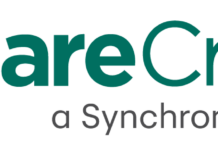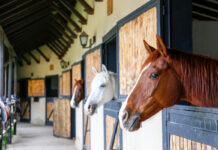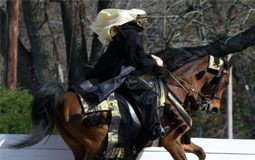
Here are just a few of the most common barn friends you might encounter during your next riding session.

Cats: You would be hard-pressed to find a barn without a cat or two roaming around or sleeping in a cozy corner. Sundown Horse Shelter in Hugo, Minnesota, has three. Do they serve a purpose or is a farm simply an attractive feline environment?
“The barn cats eat well but occasionally catch mice, field rodents, and keep the rabbits out of my garden,” says Cherie McKenzie, owner of Sundown. Plus, they’re adorable. The horses are comfortable around them and vice versa. Cats can add to the social atmosphere that horses naturally crave.

Dogs: Like cats, I haven’t been to a farm or barn yet that doesn’t house at least one dog. Big or small, many dogs seem at ease in the stable environment. They’re also usually the first to greet a visitor, one common reason for keeping dogs on the farm.
McKenzie says that she loves her two big dogs, a Newfoundland and a Saint Bernard, but they also work. “They pull sleds with hay, let us know when people come on the property, keep me company on dark nights in the pasture where the coyotes live, and have caught me from falling more times than I can count,” she explains. Moreover, they’re man’s–and woman’s–best friend!

Roosters: Why on earth would a modern-day riding center want a loud-mouthed rooster strutting about when we have those convenient little inventions known as alarm clocks at our disposal? First, they look cool. Visitors surely get a kick out of watching a rooster strut his stuff, but their presence can also help horses feel calm by keeping them company during a quiet day.

Goats: If you’re lucky, you might find a couple of goats meandering around the riding center. Hardwood Creek Farm in Hugo, Minnesota, houses not one but two Myotonic goats, commonly known as “fainting goats.” These cute critters don’t provide milk or meat; they’re simply easy and amusing keepers.
“The goats are novelties, but they also help the horses feel comfortable,” says Colleen Wick, owner of Hardwood Creek. This makes sense when we remember that horses are herd animals–they don’t like to be alone. It seems to be the more the merrier for horses, even if that means the company of a funny little goat (or two!)
Most horse lovers are animal lovers in general. McKenzie notes, “All the animals come up to me at some point during the day’s chores to get scratched, patted, or held. All animals want the same things: kindness, love, attention, food, water, and a clean dry place to lay down.”
Yes, many of the barn animals do serve practical functions, but it’s clear that they also become treasured pals for the owners, riders, and horses.
Julia Arnold is a writer living in
Minnesota with her husband and two young children. She has always loved
horses and is thrilled to have officially rejoined the horse world as an
adult. She rides whenever she can at Hardwood Creek Farm in Hugo,
Minnesota. You can follow her adventures in riding and parenting on Facebook, Twitter, Instagram, and Pinterest.






You’ll also see alpacas or sheep sometimes that serve the same purpose as the goat in being “herd mates”.
I’ve used sheep for years and know people who use alpacas
You’ll also see alpacas or sheep sometimes that serve the same purpose as the goat in being “herd mates”.
I’ve used sheep for years and know people who use alpacas